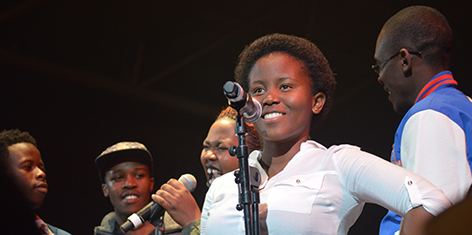Latest News Archive
Please select Category, Year, and then Month to display items
19 November 2018
|
Story Charlene Stanley
|
Photo Charlene Stanley
 Prof John Mubangizi, Dean of the Faculty of Law, encouraged delegates at the Fifth Annual International Mercantile Conference to share ideas on best international practice in their various fields.
Prof John Mubangizi, Dean of the Faculty of Law, encouraged delegates at the Fifth Annual International Mercantile Conference to share ideas on best international practice in their various fields.
“Don’t say anything online that you wouldn’t want plastered on a billboard with your face on it.”
This famous quote by international tech expert Erin Bury should be a guiding light when it comes to online habits in the workplace, according to Francois Cilliers, UFS Lecturer in Mercantile Law.
In his presentation Could Social Media be the Gateway to Employment Discrimination? he warned that employees have a responsibility not to bring their employers in disrepute through their comments on social media.
“Posts, updates, tweets, and comments are considered to be publications and can therefore never be seen as privileged information,” he explained.
Responsibility on employees and employers alike
He pointed out that employers also had a responsibility regarding the way in which they use the information about prospective employees obtained via social media.
“Nowadays, approximately 75% of companies hire through social media. In the US, recruiting companies spend hours researching candidates, making full use of what they can find on social media. It was found that 50–80% of employers frowned upon posts and pictures featuring drug and alcohol abuse, profanity, and bad grammar.”
He warned that employers needed to tread lightly, as a decision not to employ someone as a result of information on the prospective employee’s political views and sexual orientation could constitute unfair discrimination as set out in the Employment Equity Act.
“An employer who wishes to use a screening process (utilising social media) has to prove that the information and the process is objectively necessary and can be justified with reference to the inherent requirements of the job,” he explained.
“As technology and electronic systems advance, so too should the applicable labour laws.”
Cilliers’ presentation formed part of the Fifth Annual International Mercantile Law Conference recently hosted by the Faculty of Law on the Bloemfontein Campus.
Incorporating new technology in teaching and research
“This conference is an opportunity to share ideas on best practice in what is perceived as a ‘difficult’ field within Law,” said Prof John Mubangizi, Dean of the Faculty of Law, as he opened the proceedings. Topics in the discussion sessions ranged from Racism in the workplace and The underrepresentation of females in the judiciary, to Decriminalisation of cannabis: A recipe for healthy employer-employee relations?
“Conferences such as these help us to take advantage of the newest developments in technology to advance our teaching and research,” said Prof Mubangizi.
“To quote Einstein: ‘We can’t solve problems by using the same kind of thinking we used when we created them.’”
I-DENT-I-TIES tackles identity in an unusual story-telling style
2016-07-26
 One of the leading performers, Baanetse Mokhotla.
One of the leading performers, Baanetse Mokhotla.
Photo: Thabo Kessah
The I-DENT-I-TIES project has been an enormous experience for the Qwaqwa Campus students who were part of this large-scale interdisciplinary performance project. This is according to Baanetse Mokhotla, one of the leading performers.
“I have personally learnt a lot about performing arts and also grew as an individual,” Baanetse said about the production that was part of this year’s Vrystaat Arts Festival in Bloemfontein.
This massive interactive production of the 54-member student cast utilises music, song and dance in an unusual method of story-telling. It uses live video camera feeds on two big screens as well as recorded video clips of the cast itself and members of the community, some of whom were part of the audience during the two shows staged on the Qwaqwa Campus. The cast intermittently mingles with the audience, thus allowing the latter to be part of the narrative as well.
The main story line explores issues around identity while using the famous Basotho story of ‘Moshanyana Sankatana’ as a catalyst.
Two of the capturing features are the live interviews and the narration of the animated ‘Moshanyana Sankatana’ story, creating stories within a story.
Commenting about the project, SRC President Paseka Sikhosana said that he was happy to have led the student community during this proud moment.
“I loved how this show has exposed our enormously talented performers to the world. It was magical and we need more of such to ensure there will never be a dull moment on our campus,” he said.
Sociology lecturer Sivuyisiwe Magayana said: “I-DENT-I-TIES production was fresh fun. It exhibited the fact that we should be appreciative of other's differences. It also emphasised that we should move away from subscribing to an 'in-group' and 'out-group' mentality when it comes to issues of race, sexuality and identity.”
The international creative team behind this project included a New York-based Dutch director, Erwin Maas; Vienna-based Dutch theatre designer, Nico de Rooij; Djana Covic, a Serbian performance-craft-artist based in Vienna; and South African film and stage legend Jerry Mofokeng.